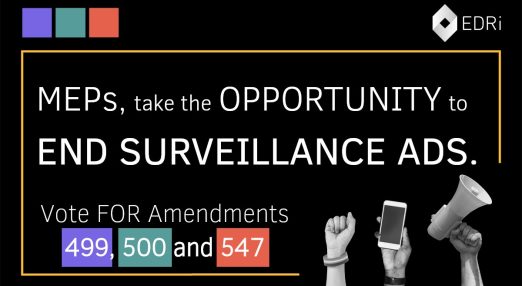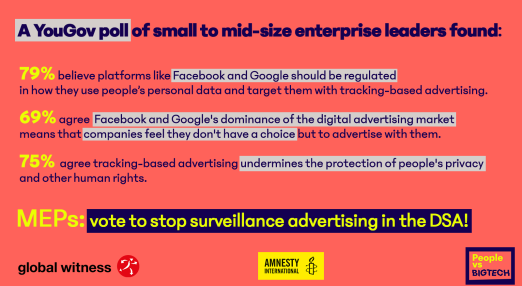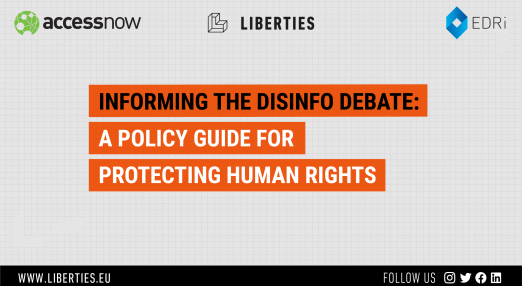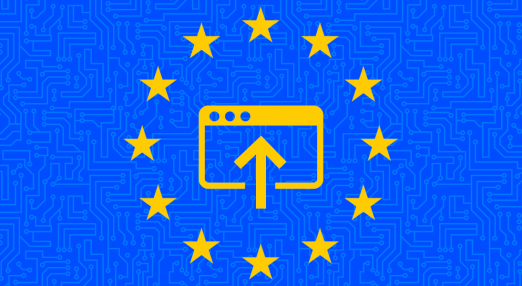DSA
Filter by...
-

The EU Parliament takes strong stance against surveillance ads
The Platform Power campaign, alongside many civil society organisations, raised its voice for stronger laws against the business model of Big Tech online platforms and succesfully pressured law-makers to put people at the center of the debate.
Read more
-

Framing the future of the internet
The European Parliament has just voted on the Digital Services Act, crucial for internet regulation.
Read more
-

European Parliament approves rights-respecting DSA & proposes ban on use of sensitive personal data for online ads
Today's upcoming vote by the European Parliament's (EP) on the Digital Services Act (DSA) is expected to be a good step forward in protecting people’s rights on the internet, including freedom of expression and information, right to safety and the right to privacy, which EDRi has strongly and consistently advocated for.
Read more
-

People ask MEPs: Take the opportunity, end surveillance ads!
Thousands of people are asking the EU Parliament to end online surveillance advertising , ahead of the DSA (Digital Services Act) vote in the plenary on Thursday, 20 January 2022. EDRi is part of the movement mobilising people, together with individual organisations in the PeopleVsBigTech group and beyond.
Read more
-

Don’t let Big Tech fool you: Small businesses don’t want surveillance advertising
Tracking-based advertising has become all pervasive in the digital world. Amnesty Tech's new research shows that small businesses know very well how harmful these practices are to human rights but have little alternative.
Read more
-

Booklet: Informing the disinfo debate
Today, 20 December 2021, EDRi, Access Now and Civil Liberties Union for Europe publish a joint report as a continuation of its 2018 predecessor, Informing the “Disinformation” Debate. The main outcome of this report is a set of policy recommendations addressed to the EU co-legislators focusing on: how to effectively mitigate fundamental rights risks that result from the manipulative methods deployed by large online platforms that exploit people’s vulnerabilities and their sensitive data; and how to combat disinformation in a manner that is fully compliant with fundamental rights standards.
Read more
-

Digital Services Act: EU Parliament’s key committee rejects a filternet but concerns remain
The European Union's Digital Services Act (DSA) is a big deal. It's the most significant reform of Europe’s internet platform legislation in twenty years and the EU Commission has proposed multiple new rules to address the challenges brought by the increased use of services online. EU members of Parliament (MEPs) showed that they listened to civil society voices: Even though the key committee on internal market affairs (IMCO) did not follow the footsteps of the ambitious DSA reports from last year, MEPs took a stance for the protection of fundamental rights.
Read more
-

Has the Parliament effectively wielded the Digital Services Act to challenge platform power? The verdict is, somewhat.
Today, the European Parliament Committee on the Internal Market and Consumer Protection (IMCO) has approved its much-anticipated report on the Digital Services Act (DSA). The DSA affects how intermediaries like Google and Amazon regulate and influence user activity on their platforms, including people's ability to exercise their rights and freedoms online. The DSA also aims at limiting the negative impact of the most powerful online platforms on people and puts limits on how EU Member States can interfere with people’s free expression online.
Read more
-

PlatformPower.eu
Imagine we live in a world where online platforms enable you to change society, are following your choices for online experience and are accountable to society about how their negative effect on society should be tackled.
Read more
-

What you need to know about the Facebook Papers
Facebook is now undergoing what may be the tech giant’s biggest crisis in its 17-year history. In October, The Washington Post reported that a second Facebook whistleblower came forward to the U.S. Securities and Exchange Commission, alleging that the company prioritises growth over combating hate speech, disinformation, and other threats to the public. The whistleblower’s testimony follows that of former Facebook employee Frances Haugen, whose legal counsel released what’s known as the Facebook Papers — a 10,000-page collection of internal reports, memos, and chat logs leaked to more than a dozen major news outlets.
Read more
-

Big-tech lobby sets the rules about big-tech in Europe
The dominance of Google and Facebook is disastrous for the public debate online. We've been saying this for a long time. But this dominance can also be felt in the regulation of the same platforms. Huge amounts of money are spent by big tech to influence European laws and regulations.
Read more
-

Platform Regulation: Key takeways from Haugen’s hearing
On 8 November 2021, Frances Haugen, the Facebook whistleblower, participated in a hearing of the European Parliament’s Internal Market and Consumer Protection Committee (IMCO). While her testimony brought extremely important insights into Facebook’s opaque operations, it also showed that Haugen’s thinking of what the digital world in Europe should look like is influenced by her expertise in data science rather than public policy, as well as by her professional experience working with Silicon Valley’s centralised mega-platforms.
Read more
